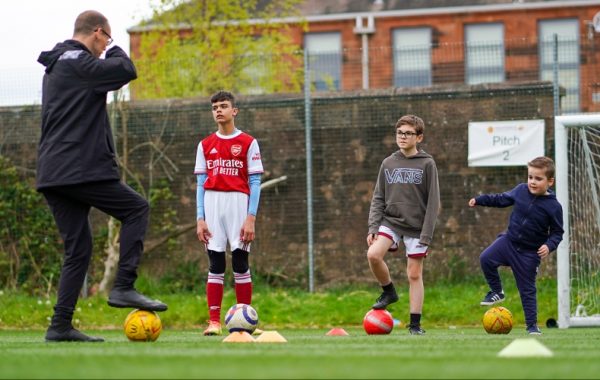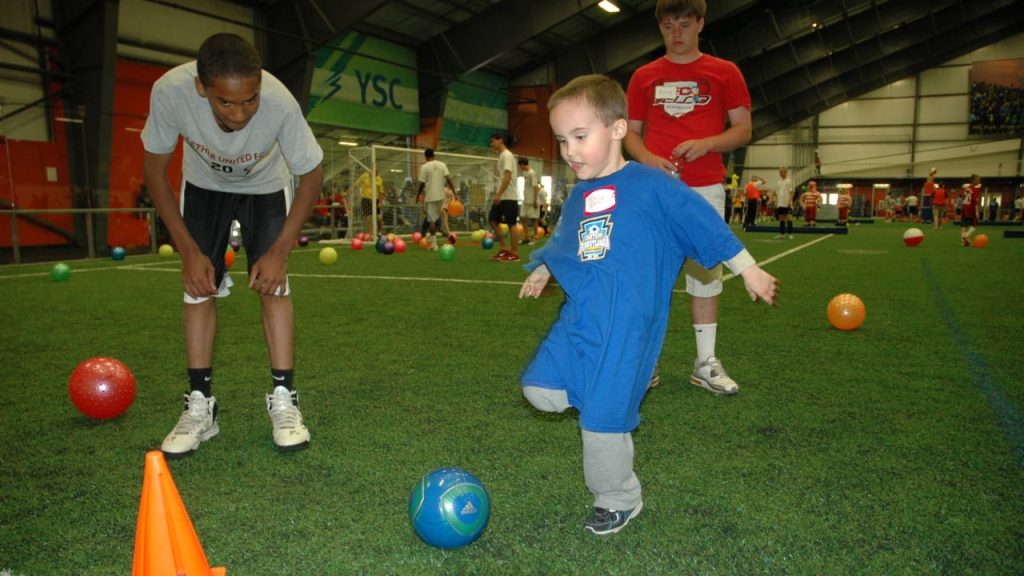If you’re a parent of a child with autism, you must sometimes have thought how to get your child physically active, right?
It can be somewhat challenging for them to join, with the sensory sensitivities, social difficulties, and physical coordination that some sports require. But let me tell you why soccer might just be the perfect sport for your kid.
It is simple, flexible, and fun, one of those sports that any kid, irrespective of ability can jump into.
And it is not just a game of running around and kicking a ball, soccer offers unique opportunities for growth in all sorts of areas: physical, social, and emotional. For children on the autism spectrum, it can be a real game-changer.
Alright, now let us look into the various reasons why soccer is considered a great sport for autistic kids.
1. Soccer Is Simple to Learn and Easy to Play
Arguably one of the best things about soccer is that it is relatively easy to learn, how to play and implement its rules on the field.
The equipment used for this particular sport is pretty basic as well, and not much has to be remembered. It’s only a ball and two goals and the basic notion of moving that ball from point A to B.
For a child on the spectrum that might be comforting.
Many sports have complicated plays or intricate skills to learn, while soccer is all about running, kicking, and playing in an easily understandable area.
For children who may have issues with their motor skills, the three primary movements of soccer is kicking, running, and changing direction-are not only achievable but with time help improve coordination. When kids are having fun, they are more willing to continue.
And the more they do it, the better they become, which is fantastic for building confidence.
2. Soccer Does Have Structure, but Not Too Much
Most children with autism feel good in an environment when some clear structure is available. Soccer provides that: there are set rules, and the match does have a somewhat predictable flow-two teams, one ball, 90 minutes of action.
But within that structure is room for flexibility.
Players can decide whether to pass, dribble, or shoot, and they have to adapt to what happens around them. This balance of structure and spontaneity is incredibly important for children on the spectrum. They get the routine they crave, with just enough variation to make things exciting and promote growth.
For kids who easily stress over changes, soccer allows them to understand small-sized and reasonable changes.
A play may not go as intended, or the ball can be passed to at any moment in time, and learning to adjust during those times can help other areas in their lives and make them, in general, much more adaptable.
3. It is a very good way to improve social skills.

We know that kids with autism face difficulties, especially when it comes to social interaction. That is where soccer shines: it is a team sport, meaning kids need to communicate, work together, share the ball.
Even if they are not the most vocal player, they still need to make eye contact, gesture, or use some form of body language to communicate with teammates.
It’s the small interactions that can help the child build on social skills without feeling quite so forced or uncomfortable as in more mainstream social situations.
Soccer also teaches kids how to read social cues on the fly: Who’s open for a pass? Who needs support on D? What is the body language of the opposing player?
As kids get more experience, they read these non-verbal cues and that lets them better understand the social dynamics when they are off the field.
Also, children with autism tend to feel that they are part of something-a team. They are not just participants, but they actually contribute to something greater than themselves.
It is a very empowering feeling that might help a child lessen alienation and build their self-esteem.
4. Improves Focus and Attention

Let’s be upfront here: it’s tough getting any kid, much less a child with autism to pay attention. There’s so much in the world that may distract, and for kids with autism, sometimes the world is overwhelming.
Then there’s soccer, with a fantastic way of capturing kids’ attention: the ball is always in motion; the game is never really the same. It’s hard to get bored when you’re chasing a ball up and down the field.
Soccer requires players to be aware of their surroundings: to keep track of the ball, to hold their position, and to watch their teammates. It is this level of engagement that enhances their focusing and attention span over time.
It doesn’t feel like work.
Kids are so absorbed in the game that they aren’t even aware of how much they’re practicing their concentration skills.
CHECK OUT | Is My Child Too Small To Play Soccer? Why Size Doesn’t Matter
5. It Can Be Played in a Sensory-Friendly Environment
One of the biggest obstacles for kids with autism is sensory issues. It’s difficult for many children to handle bright lights, loud sounds, and crowded spaces.
Fortunately, soccer is usually played in open, outdoor environments that can alleviate some of these issues. A soccer field has a lot of open space and literally and figuratively leaves some space to breathe.
And for the kids who might be more sensitive to sensory input, the game can be adapted. Maybe they like smaller groups or a quieter practice session-that’s doable, absolutely.
Also, many community soccer programs designed for kids with special needs have accommodations like sensory breaks or a no-sensory environment just to make sure all kids are comfortable.
Besides, there is something about the feel of kicking a ball or running on the grass that puts many kids at ease. Those periodic repetitions are therapeutic, so to speak to those who may have real difficulty in setting their energies or calming down.
6. Soccer Builds Confidence
The most beautiful things about soccer are the constant opportunities for small wins.
Whether or not the child manages to be able to dribble for the first time, execute a pass, or score a goal, every achievement-however insignificant it may seem-builds confidence, and that is important for any child, but even more important for a child with autism who may already feel like they’re different or less capable than their peers.
Soccer teaches kids that progress takes time, but every step forward is an achievement.
They learn not to be as hard on themselves every time they make mistakes, because mistakes are a part of learning. These feelings of accomplishment after mastering some skill or helping one’s team win cannot be measured in words and might influence other life spheres too.
7. Problem-Solving on the Field
Besides being physical, soccer is a mental sport; players need to make quick decisions on whether to pass, shoot, or dribble, which requires a tactical way of thinking. This problem-solving aspect in soccer is great for kids with autism to practice thinking on their feet.
And yes, for some kids, this might be difficult initially but once again through repetition, kids get better at making these decisions.
They get into a flow where they realize the patterns of the game and somewhat know what is going to happen, so they make good choices. These problem-solving skills won’t stay on the field alone; instead, they help kids turn out to be more resourceful and cope with situations better in general life.
8. Emotion Regulation
Many kids on the spectrum struggle with their emotional regulation: being easily overwhelmed or having difficulties expressing emotions appropriately.
Soccer-with its ups and downs, winning and losing, scoring and missing-is a safe place for kids to experience and learn regulation of emotions.
In case of failure, such as a missed shot or loss for their team, they understand how to handle disappointment within an encouraging environment.
When they score or make a great play they feel the thrill of success.
These highs and lows continue through their years, becoming much more familiar while learning how to respond in a healthy manner. The emotional development is invaluable and does not just apply to soccer, but also for living life.
CHECK OUT | 7 Effective Ways for Your Child to Earn More Playing Time in Soccer
9. Soccer Is Inclusive and Adaptable
One of the best things about soccer is that it’s adaptable. If your child needs extra support or modified rules to feel comfortable, that’s just not a problem.
Many inclusive soccer programs are designed to accommodate kids with autism and other developmental differences. Those often include smaller teams, shorter games, and breaks that are tailored to players’ needs.
But beyond those specialized programs, soccer falls into one of those sports that can be easily and comfortably adapted to any child’s capabilities.
You can play so easily at home in the backyard one-on-one with a friend or join a small group or even enter into a more organized league. That flexibility makes it very easy for kids to start at their own pace and work themselves into the flow more slowly.
10. A Lifetime of Fun

Soccer is not only a sport that your child can enjoy as a kid, but it’s also a vocation they can enjoy their whole life. Whether they turn into competitive players, casual weekend warriors, or lifelong fans of the sport, soccer is one of those games that stays with you.
For kids on the autism spectrum, finding this kind of hobby or passion that might carry them through multiple stages of their life is pretty important.
Be it that they want to simply kick the ball around with friends or play professionally, that is irrelevant; what really matters most is that they found something they like doing, and that which gives them a sense of accomplishment and happiness.
Soccer could be that lasting source of happiness and connection for your child.
CHECK OUT | 7 Best Ways to Keep Your Soccer Kids Healthy
Practical Tips for Parents
If you’re a parent considering soccer for your child with autism, here are a few practical tips to help make the experience as smooth and beneficial as possible:
Focus on Fun: Above all, make sure that your child is enjoying the experience. Soccer should be a positive and rewarding activity, not something that add
Start Slowly: Begin with casual, non-competitive play to introduce your child to the sport. As they become more comfortable, you can explore team options.
Communicate with Coaches: Be upfront with your child’s coach about their needs and any accommodations they might require. Most coaches are more than happy to work with parents to create a positive experience.
Use Visual Aids: Many children with autism respond well to visual aids, so consider using pictures or videos to explain the rules of soccer before your child steps onto the field.



